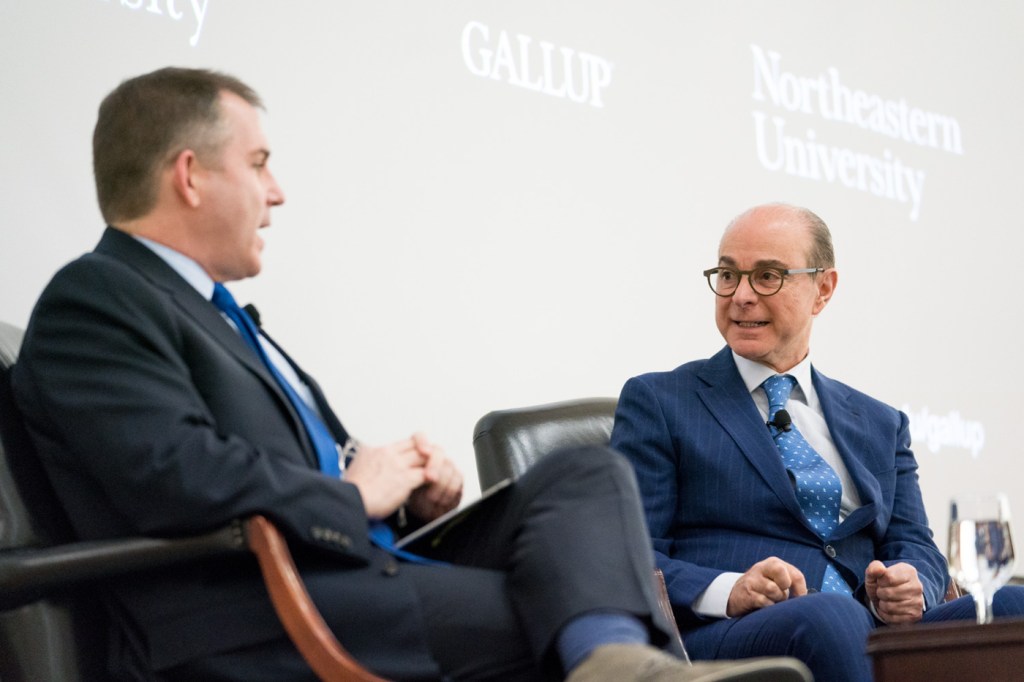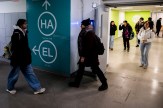Northeastern, Gallup release findings from national AI survey

On Wednesday, Northeastern University and Gallup released the findings from a new national survey, which found that most U.S. adults have an overall positive view of artificial intelligence but worry about its impact on jobs and the economy. The findings were revealed at an event in Washington, D.C., during which Northeastern President Joseph E. Aoun sat down with New York Times columnist Frank Bruni to discuss higher education’s role in preparing learners for the AI revolution.
For Aoun, the solution comes down to a question of turf. “If you compete with computers and artificial systems on their turf, you’re going to lose,” Aoun said. “If they compete with us on our turf, they are going to lose. Therefore, the question is, ‘What is our turf?’ What can humans do that robots cannot do?”
This point cuts to the heart of Aoun’s new book, Robot-Proof: Higher Education in the Age of Artificial Intelligence. In the book, he lays out a blueprint that involves educating learners to master three new literacies: technological literacy, data literacy, and human literacy.
Our core mission is educating people for life and making them robot-proof, and that’s an enormous opportunity.
Joseph E. Aoun, President of Northeastern
The reality, according to Aoun, is that people will need to continually reeducate themselves to compete in the future digital economy, and colleges and universities must think more about how they can provide personalized learning while partnering with employers to retrain working professionals.
“Our core mission is educating people for life and making them robot-proof, and that’s an enormous opportunity,” Aoun said Wednesday.
Bruni asked Aoun whether companies would start launching their own programs to educate and retrain their employees. Aoun responded that companies have already begun these efforts, and in response higher education must do more to meet working professionals’ needs where they are by providing customized and personalized learning opportunities. Northeastern, he added, has launched partnerships with GE and IBM to meet this need.
“It will require that we in higher education to bring the employers to the table and ask, ‘What are your needs how can we meet your needs?’ That’s an opportunity for us,” Aoun said.
The survey findings
At the event, Brandon Busteed, Gallup’s executive director for education and workforce development, presented the key findings, among which were that most U.S. adults have an overall positive view of artificial intelligence, with 79 percent of Americans saying AI has had a “mostly positive” or “very positive” impact on their lives thus far.
However, despite the optimism, a clear majority of Americans, 73 percent, expect the increased use of AI will eliminate more jobs than it creates. And only 22 percent of Americans with a bachelor’s degree or higher level of education say their college or university studies prepared them well or very well to work with AI.
News@Northeastern reported on the survey results Wednesday morning and produced a data visualization breaking down the key findings. The Chronicle of Higher Education, Inside Higher Ed, and Fast Company are among several media outlets that have also highlighted the findings.
AI and the impact on jobs
After Busteed presented the results, Aoun moderated a panel discussion featuring experts from academia, industry, and government.
Daniela Rus, director of the Computer Science and Artificial Intelligence Lab at the Massachusetts Institute of Technology, underscored the extraordinary strides in AI technology to date. Smart machines can do everything from crunching data to moving with precision better than humans. However, she noted the technology still has a long way to go, particularly in developing common-sense reasoning. The key going forward, she said, is to identify how people can partner, not compete, with machines.
“It should be about us trying to figure out how to use these new technologies as tools that will empower us … to augment us, not replace us,” Rus said.
Views mixed in optimism over AI’s impact
The panelists differed in some ways over their optimism about AI’s impact on society. Rus hailed the benefits of these new technologies and their ability to improve our lives, noting for example how AI is helping doctors diagnose diseases and connecting people across the globe. “I believe that AI will take on the routine tasks and allow us to focus on what we find interesting and what we find powerful and fulfilling in our lives.” She emphasized, though, that people must continue to train and learn new skills to prepare themselves for the future.
Matthew Sigelman, CEO of Burning Glass Technologies, said he shared that optimism overall, but in a different way. “If our frame of debate is around job stability, then AI is a deep threat,” he said. “It is replacing human activity in a whole array of jobs and in some cases the majority of certain kinds of jobs. If our frame of discussion is around job or career mobility, AI is a tool that can unlock a huge amount of opportunity.”
Kristin Sharp, executive director of New America and Bloomberg Media’s joint initiative, “SHIFT: The Commission on Work, Workers, and Technology,” expressed some caution with respect to AI’s impact on the future of work. She pointed to what she described as an “alarming” finding in the Northeastern/Gallup poll: that only 18 percent of Americans say they are extremely confident they could secure the education needed to obtain a comparable job should they lose their current position to advances in new technology.
Putting the “art” in artificial intelligence
U.S. Rep. Suzan DelBene of Washington, who serves as co-chair of the House Democratic Caucus’ New Economy Task Force, explained how the country’s education system, particularly at the K-12 level, can help prepare young people for the AI revolution. She said amid the increasing emphasis on STEM education in the fields of science, technology, engineering, and math, too often arts programs are being cut. The arts, she said, promote creativity and innovation—key ingredients in not just creating new technologies but understanding how people will interact with them.
DelBene later touched on the importance of the arts during the Q&A portion of the event, when a representative from the American Alliance for Museums asked how arts and museums can help people with computational literacy. DelBene explained that music is quite analytical and could inspire someone to explore his or her computational or analytical side.
That excitement to learn, DelBene added, is a critical ingredient to lifelong learning. “If that passion is not there, people may know they have to be lifelong learners but they may not pursue it in the same way,” she said. “If you love what you do, you do a better job.”





